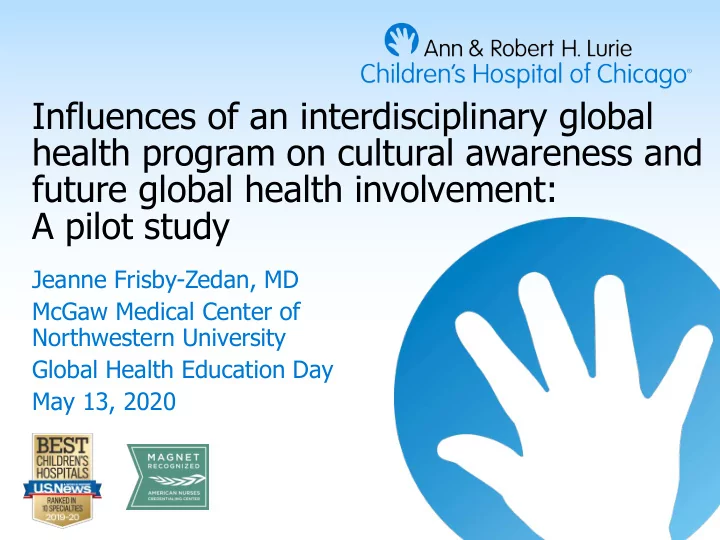

Influences of an interdisciplinary global health program on cultural awareness and future global health involvement: A pilot study Jeanne Frisby-Zedan, MD McGaw Medical Center of Northwestern University Global Health Education Day May 13, 2020
2
Background • Medical students and residents have an interest in being involved in global health activities. • Barriers to residents’ involvement in global health include lack of educational or field experience structure, lack of financial resources, and lack of time. • Participation in college, medical school, or residency specialty- specific global health programs makes a physician more likely to be involved with global health work or work with immigrant, refugee, or underserved populations in the future.
Background • McGaw Medical Center of Northwestern University’s Global Health Clinical Scholars Program is a 2 year multidisciplinary program that includes: – Medical and Ethics Simulations – Lectures in medicine, law, economics, sociology, environmental health, and ethics – Scholarly Project – At least 1 month of field experience. Pediatrics residents Photo courtesy of Lucas Bruton, MD can choose from Tanzania, Bolivia, Refugee Health, or an alternative well-established site. – Formal debriefing
Hypothesis • A multidisciplinary approach to global health education within residency training improves overall self-reported cultural awareness and is a predictor of global health involvement in future career choices.
Methods • Self-reported questionnaire of physicians who graduated from the Ann & Robert H. Lurie Children’s Hospital of Chicago/McGaw Northwestern Pediatric Residency Program from 2013-2019 • Collected – Baseline Characteristics – Likert Scales of Agreement (scale of 10) regarding self awareness and cultural awareness within the global health sphere – Current involvement in global health work or work with immigrant/refugee populations – GHCS graduate satisfaction with the program and important lessons learned • Analysis – T-test and Chi-Square Analysis
Baseline Characteristics GHCS (n=8) No GHCS (n=56) Mean % (n) Mean % (n) Range Age 32.38 33.15 29-48 Gender Male 12.5 % (1) 14.29% (8) Female 87.5% (7) 83.93% (47) Other/Unknown 0% (0) 1.79% (1) Race/ethnicity Non-Hispanic White or Euro-American 75% (6) 71.43% (40) Black, Afro-Carribean, or African American 12.5% (1) 3.57% (2) Latino or Hispanic American 0% (0) 5.36% (3) East Asian or Asian American 0% (0) 5.36% (3) South Asian or Indian American 12.5% (1) 8.93% (5) Middle Eastern or Arab American 0% (0) 0% (0) Native American or Alaskan Native 0% (0) 0% (0) Other 0% (0) 5.36% (3)
Results Understanding of Impact Being a Understanding of Impact Being a Visiting Physician in Another Physician in Another Country on Will Have on You Country Will Have on Locals 10 10 8.25 7.5 8 8 6.5 6.22 Likert Scale Likert Scale 6 6 4 4 2 2 0 0 GHCS No GHCS GHCS No GHCS Preparedness for Obstacles Encountered in a Foreign Culture 10 9 8 7 7 6.29 Likert Scale 6 5 4 3 2 1 0 GHCS No GHCS
Results Current Involvement in Previous Global Health Global Health Activities Experience 100 100 87.5 80 80 % Involved % Involved 60 60 44.6 37.5 40 40 21.4 20 20 0 0 GHCS No GHCS GHCS No GHCS Current vs Ideal Involvement in Global Health Experience in Global Health Activities Residency 40 100 100 33.75 35 30 80 % Involvement 22.5 % Involved 25 20 60 51.8 GHCS 20 No GHCS 15 40 7.85 10 20 5 0 0 GHCS No GHCS Current Involvement Ideal Involvement
Results • Barriers to current global health involvement or work with refugee/immigrant populations – Time 46.9% (30/64) – Salary Support 39.1% (25/64) – Family 25% (16/64) – Concerns About Safety 10.9% (7/64) – Other 18.8% (12/64) 10
Lessons Learned from GHCS Graduates • “It has made me more understanding of various approaches to medicine and more appreciative of the surplus we have in the US. It has also factored significantly into my research and career plans for medical education.” • “The experience was filled with countless moments and lessons that impacted me and shape the way I practice medicine today...mostly improving my competence to accept cultural differences, practices, and world views.” Photo courtesy of Katie Pavia, MD
Conclusions • An interdisciplinary global health program has an influence on cultural and self-awareness within the global health sphere. • There is a need for further institutional structure, support, and funding for global health activities and care of refugee/immigrant populations in order to increase global health involvement. • Future studies will expand to include graduates from other specialties at McGaw.
Acknowledgements • Thank you to Elizabeth Groothuis and Ashti Doobay-Persaud for their support in creating and implementing this study. • Thank you to Sharon Unti for support of this study within the residency program. • Thank you to Brad Lynk for help with connecting with Lurie Children’s Pediatric Residency alumni.
References • Nelson, BD et al. Global health training in pediatric residency programs. Pediatrics. (2008), 122(1): 28-33. • Castillo, J et al. The Resident Decision-Making Process in Global Health Education: Appraising Factors Influencing Participation. Clinical Pediatrics. (2012), 51(5): 462-467. • Jayaraman, SP et al. Global Health in General Surgery Residency: A National Survey. Journal of the American College of Surgeons. (2009), 208(3): 426-433. • Gupta, AR, et al. The International Health Program: the fifteen-year experience with Yale University’s Internal Medicine Residency Program. The American Journal of Tropical Medicine and Hygiene . (1999), 61(6):1019-1023. • Ramsey, AH et al. Career Influence of an International Health Experience During Medical School. Family Medicine. (2004) 36(6):412-416.
Recommend
More recommend